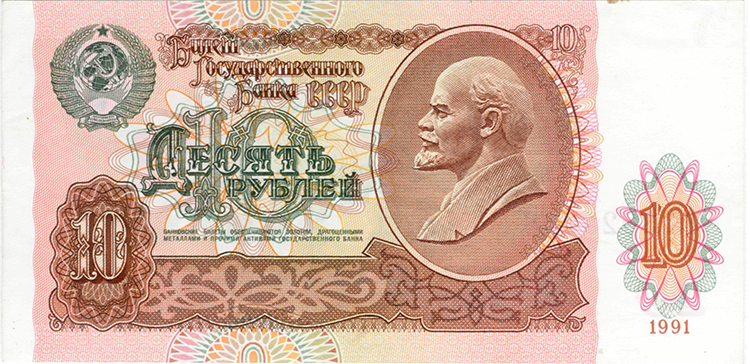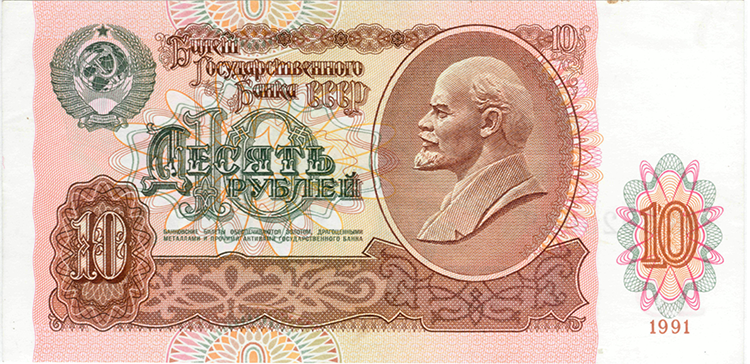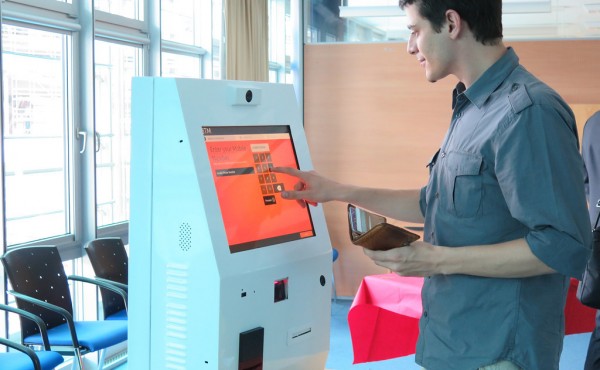
Cryptocoins for good: Cryptocurrencies Empowering Citizens Against Oppressive Governments
How cryptocurrencies can change the balance of power between dictators and citizens
the “control by the ruble” of the Soviet Gosbank, to the dual currency
system in Cuba, China’s overvaluation of the Yuan, or the exchange
controls in countries like Venezuela and Iran, regimes of all types have
relied on these kind of controls to rein, or at least try to rein,
capital flights, inevitable when -sooner or later- markets try to
correct the excesses committed by money-hungry “revolutions”.
 |
| The Gosbank controlled the currency markets using what it came to be known as the “control by the ruble” |
citizens are usually the most affected by such currency controls: as a
pseudo-monopoly is established, a black-market is instantly created and
exchange rates climb inexorably, specially in left-leaning regimes where
the government aims for greater control of all aspects of the economy,
affecting the efficiency of the production system and pushing the
trade-balance the wrong way, increasing in consequence the amount of
foreign currency required to cover internal demand. In short, more
expensive currency is required to buy each time more stuff, the result?
Rampant inflation and even more poverty.
Marxist theory says that the structure of society must be based in
keeping people in poverty, ruled by an upper class with certain rules,
norms and such in order so they can keep people like that. This
old-proven-wrong-policy is still used by many governments today, in
February 2014, for example, some education minister of a Latin American
country said that the government “wasn’t going to take people out of
poverty so they can become political opponents”. This proves that
currency controls are not a consequence of failed economic policies, but
tools for the governments to exert repressing power over its citizens.
what would happen to oppressive regimes if they were to lose control of
the currency exchange, so the people is free to manage their wealth
beyond the power of government currency controls? Currency
decentralization is not new, 20th century economist and Nobel Prize
Winner, Friedrich August Von Hayek (F.A. Hayek), theorized extensively
on this subject, and though polemic, his writings provided an important
part of the theoretical framework for modern economics, specially in
areas such as theory of money and economic fluctuations.In his book Theory of Liberty he wrote:
“The
experience of the last fifty years has taught most people the
importance of a stable monetary system. Compared with the preceding
century, this period has been one of great monetary disturbances.
Governments have assumed a much more active part in controlling money,
and this has been as much a cause as a consequence of instability. It is
only natural, therefore, that some people should feel it would be
better if governments were deprived of their control over monetary
policy. Why, it is sometimes asked, should we not rely on the
spontaneous forces of the market to supply whatever is needed for a
satisfactory medium of exchange as we do in most other respects?It
is important to be clear at the outset that this is not only
politically impracticable today but would probably be undesirable if it
were possible. Perhaps, if governments had never interfered, a kind of
monetary arrangement might have evolved which would not have required
deliberate control; in particular, if men had not come extensively to
use credit instruments as money or close substitutes for money, we might
have been able to rely on a self-regulating mechanism. This choice,
however, is now closed to us. We know of no substantially different
alternatives to the credit institutions on which the organization of
modern business has come largely to rely; and historical developments
have created conditions in which the existence of these institutions
makes necessary some degree of deliberate control of the interacting
money and credit systems (my emphasis). Moreover, other circumstances
which we certainly could not hope to change by merely altering our
monetary arrangements make it, for the time being, inevitable that this
control should be largely exercised by governments”
 |
| Governments have assumed a much more active part in controlling money, and this has been as much a cause as a consequence of instability F.A. Hayek |
what if it was no longer inevitable? During the 20th century creating
and managing currencies was only possible for governments, so it was in
essence exclusively a political matter, but technology is changing that,
money issuing is not only government turf anymore, they now must
compete with cryptocurrencies. In governments with an effective rule of
law, this can be fair competition, for example, currencies can be
somehow regulated -as the IRS recently did in the US- and a legal
framework can be established so everyone can play by the rules. But,
there are many countries where the line between state and nation is
blurred, these countries may also take two additional paths, they can
prevent financial institutions or businesses from transact with
cryptocurrencies (e.g. Colombia and China) or they can declare an
outright ban (as it is rumored about China every single day). In both
scenarios cryptocoins could have a very important role, in the former
-while remaining legal- they can create a new channel for the flow of
foreign currencies, in the latter they can work as a relief valve, as an
alternative for the black market. In any case, by increasing the supply
of foreign currency, these coins can effectively push prices down, with
all the benefits that comes with it.
once, the development model that could arise from an efficient
cryptocoins market presents a development plan that is not based on
plain charity, in giving away something with the hope that the recipient
will make a good use of it and luckily return it back in future
productivity. People cannot only mine their own coins but they can rest
assure that the value of such money will be subject to fair rules of
supply and demand, not to devaluation-based political planning; and most
important, they may not be held hostage in poverty by exchange
controls, giving back to them a little of that sovereignty that
dictators keep claiming or themselves.
Open your free digital wallet here to store your cryptocurrencies in a safe place.

Virtual and digital currencies can challenge the sovereignty of states

official. At a recent digital money conference in Dublin, he mentioned
that rivals are interfering with a bank’s ability to sway the price of
credit for the entire economy. Murphy warned that there might be
considerable threat to the finances of a country if increasingly more
transactions for services and goods fade away from the tax system due to
the use of crypto currencies such as Bitcoin. He added:
“Central banks, [out] of necessity, have monopolized the exercise
of these functions. Virtual currencies pose new challenges to central
banks’ control over these important functions.”
Bitcoin conference. It gathers the brightest minds in finance,
payments, banking, and business. The goal is to host fearless debates on
the risks and opportunities involved with decentralized currencies.
Bitfin (Bitcoin Finance) wants to shape
the future of corporate strategy, commerce, and economic policy in the
current industry of peer-to-peer digital money. “Bitcoin Finance is the
digital money conference you’ve been waiting for,” the official press
release reads.
trigger significant drops in economic activity. The Central Bank has
constantly emphasized that it doesn’t recognize digital currencies such
as Bitcoin in Ireland. Nonetheless, those who choose to use Bitcoin anyway won’t have consumer protection.
Murphy is well aware that virtual currencies could offer a great option
for people looking to buy and sell different services and goods. He
added that in these circumstances, the anti-money laundering rules will
be thoroughly tested. Failure of settlement infrastructure and
payments, or any sort of “financial plumbing,” could have a great impact
on the country’s economic activity and consumer confidence. Murphy
said:
“In effect, economic activity is the aggregate of domestic
transactions in the ‘euro-denominated economy’ and the ‘virtual currency
economy.’”
institutions and banks will most likely feel the effects. Other major
financial institutions don’t see Bitcoin as a threat to their
operations. However, in Murphy’s view, these institutions would be
foolish to have this kind of attitude towards the technology,
mentioning:
“This is likely to have a profound operational impact on these firms and their regulatory risk profile.”
economic challenges. Digital currencies defy the way these institutions
calibrate exchange rates, monetary policy and set price of credit.
Supporting Bitcoin and encouraging its growth would have to be
attentively monitored. Gareth Murphy added:
“The existence of a ‘euro-denominated economy’ and a ‘virtual
currency economy’ raises the prospect of an internal balance of payments
between two sub-economies where suppliers may prefer one currency over
another as a means of payment (for different goods and services).”
the most frequently used on a global scale. Bitcoin undermines a
central bank’s ability on matters such as economic analysis, data
collection, supervision, policy formation, enforcement and resolution,
so these sort of implications can’t be overlooked.
shouldn’t take things for granted and assume its actions will keep
falling under US and Switzerland regulations. He did mention that
Bitcoin should be used to support indefinite innovations that may come
from a wiser use of the technology:
“We should not presume that current regulations are
future-proof. It is possible that further innovations will mean that
these regulations may no longer apply. This suggests that new
regulations may ultimately be needed which are based on new legal
concepts with a clear scope which must stand the test of time.”
because they’re offering lower fees, commissions, greater convenience
etc. Bitcoin might gain control over the most important functions of
exchange rate and monetary policy. In spite of the currency’s relative
instability, more people are turning their attention to Bitcoin, and the
more publicity it receives the higher chances it has to become
ubiquitous in our everyday lives.
Open your free digital wallet here to store your cryptocurrencies in a safe place.

Winklevii Bitcoin ETF under the ‘COIN’ symbol
As some have speculated, evident of the twins’ latest filing, the first of its kind bitcoin ETF will trade on the NASDAQ under the ‘COIN’ symbol.
“Identifying the ticker symbol and the exchange are two major events that further demonstrate that we are moving forward as expected.”
Open your free digital wallet here to store your cryptocurrencies in a safe place.

Tim Draper, venture capitalist, wins government Bitcoin auction
(OnBitcoin) Tim Draper,
a Silicon Valley venture capitalist, was the sole winner of the US
Marshal Bitcoin auction. Mr. Draper purchased all 30,000 BTC, outbidding
many other participants in the auction such as Barry Silbert’s
SecondMarket.
Draper is an investor in Vaurum, an exchange platform for financial institutions.
In a statement,
Vaurum founder Avish Bhama said that Draper’s new bitcoins will be used
to provide liquidity to emerging markets through Vaurum.
“Bitcoin frees people from trying to operate in a modern market
economy with weak currencies. With the help of Vaurum and this newly
purchased bitcoin, we expect to be able to create new services that can
provide liquidity and confidence to markets that have been hamstrung by
weak currencies,” said Draper. “Of course, no one is totally secure in
holding their own country’s currency. We want to enable people to hold
and trade bitcoin to secure themselves against weakening currencies.”
Open your free digital wallet here to store your cryptocurrencies in a safe place.
Deloitte: media ‘distracting’ from Bitcoin’s disruptive potential
(CoinDesk) The report, titled ‘Bitcoin: Fact. Fiction. Future.’ and authored by Tiffany Wan and Max Hoblitzell, points out that the media tends to focus on bitcoin’s volatility, government crackdowns and exchange meltdowns instead of “its potential long-term significance as a disruptive new money technology”. In addition, Deloitte UP sees potential for bitcoin in fields that are often overlooked even by proponents of the digital currency:
“Bitcoin is more than just a new way to make purchases. It is a protocol for exchanging value over the Internet without an intermediary. Much has been written about the payment applications of bitcoin, including remittances, micropayments, and donations. However, bitcoin could soon disrupt other systems that rely on intermediaries, including transfer of property, execution of contracts, and identity management.”
Bitcoin evolution and new use cases
system, and why it has to deal with less overhead than the traditional payments system.
Speculation and regulation
caveats. Speculators rank high on the list, adding to the volatility and creating the impression of a get-rich-quick scheme. Thus, they introduce more reluctance on the part of everyday investors. The regulatory environment still leaves much to be desired. Like speculation, regulatory moves have a big impact on the price, creating even more volatility.
More than money
“Today, if someone buys a donut with a credit card, the merchant pays an interchange fee to the credit card issuer. This interchange fee is usually a small flat amount (10-20 cents) plus a percentage of 1-3 percent. For a low-margin good like a donut, a 10- to 20-cent flat fee can approach 100 percent of the cost of goods. This interchange fee is often passed on to the customer. Using bitcoin, the transaction fee could be lowered to as little as 1 percent. This could ultimately evolve into a new payment system for credit card companies and banks.”
New use cases
various contracts. Using the bitcoin protocol to manage identities would practically eliminate the possibility of forging identification documents and it would help put confidence artists out of work. A network operated by the government, a contractor or any other entity could verify anyone’s identity simply by scanning a bitcoin key.
About the publisher
Open your free digital wallet here to store your cryptocurrencies in a safe place.

Major Italian newspaper il Giornale accepting Bitcoin for digital subscriptions
for digital subscriptions, we’re learning from a reader email this
morning. The bitcoin logo is boldly visible on il Giornale‘s digital subscriptions page [link], where nearby it says, “The Journal is the first newspaper in Italy and in Europe who accepts payments in Bitcoin.”
all news categories and articles in PDF files optimized for Android
smartphones, iPads, and other tablet devices.

given the paper’s previous interest in the digital currency. In early
February, the paper put up a bitcoin paywall as a test of how users
would interact with using bitcoin (users had the option of donating to a
non-profit). The results were overwhelmingly positive, with 713 donors.
While we haven’t exactly seen widespread adoption of bitcoin for
digital news subscriptions, it’s nice to see it getting a start in Italy.
Open your free digital wallet here to store your cryptocurrencies in a safe place.
Family to travel across the US, apending only Bitcoin
their family of four this week, during which they will only spend
bitcoin.
Washington on Friday, the first stop on the “Uncoinventional Living
Tour”, for the Bitcoin in the Beltway conference.
annual Porcupine Freedom Festival and then to Kansas City, Missouri –
Bleish’s hometown – over the Independence Day holiday before returning
back to Texas.
Fighting a different way
and Bleish are both grassroots activists that spent years fighting the
political system in the US. Each helped start local political action
committes that focused on constitutional activism, civil liberties and
anti-police state causes in their hometowns of Austin, Texas and Kansas
City, respectively.
realisation that they needed to change their lifestyle choices – opting
instead to look for ways of being self-sufficient and building
communities separate from government influence. Bush told CoinDesk:
“We
started to think that if we really want to change the world to create a
more free society, the first thing we can do is to change the way we
live and start to live more free ourselves, and stop participating in
centralised or coercive institutions … Both of us began to realise that a
lot of work we were doing wasn’t making us more free. In fact, it was
just exhausting us and spending all our energy and our money and our
time.”
The Blush family farm
off the grid, the family moved just outside of Austin, to start a farm
on which it produces its own food, provides its own source of water and
harvests its own alternative energy.
lifestyle to be realised, they’ve set goals: to produce 50% of their own
food, store 50% of their own water, and reduce their dependency on the
central energy grid by 50%.
said Bush. “Trying to document and educate people about the values of
living a voluntary, natural life.”
their lives as they learn each day from their lifestyle, their
communities and themselves, as well as teach others how everyone can be
self-reliant and free from government influence – without fighting.
After they’ve wrapped filming for episodes five and six of “Sovereign
Living” they hope to be able to share it with the world through a media
streaming service like Netflix or Hulu.
Planning ahead
mentioned that this is the first time in their bitcoin experience where
they’ve had enough tools and resources to live on bitcoin alone, citing
platforms such as Gyft and eGifter, as well as the recent news by Expedia. Nevertheless, she emphasised the amount of effort it takes to plan a bitcoin-only itinerary:
“It’s
hard, it’s taken a lot of pre-planning. I had to look at every single
stop along the way and see what gas stations they had to make sure that
we were buying the appropriate amount of gift cards for each gas
station.”
the northeast of the country, she found Exonn gas stations at each stop,
but that on the drive back home there weren’t any – but there were BP
stations.
added: “I want the world to know that it is possible to travel the
country using bitcoin only. And it’s not only possible but you can do it
comfortably and take care of a family of four along the way.”
Open your free digital wallet here to store your cryptocurrencies in a safe place.

Education to consider for the Bitcoin user
(CoinTelegraph) This month, the number of educational institutions welcoming students who wish to pay using digital currency has increased substantially. This comes as no surprise, however, since the current academic year just ended, registration is opening up for the fall semester.
The King’s College, NYC, US
One of the leading institutions in the United States – The King’s College announced that it will be welcoming students who want to pay using Bitcoin.
The King’s College is a Christian liberal arts college founded in 1938 by Percy Crawford, located in Lower Manhattan, New York.
Now with help of New York’s Coin.co it becomes the first accredited
college in the US to accept digital currency. Dr. Gregory Alan
Thornbury, President of The King’s College stated:
“The King’s College seeks to transform society by preparing students
for careers in which they help to shape and eventually to lead strategic
public and private institutions. Allowing Bitcoin to be used to pay for
a King’s education decreases our costs while simultaneously allowing
our students to be a part of this exciting new technology.”
Team Treehouse
On Thursday June 12, a famous US-based online education provider – Team Treehouse – officially announced that it will be accepting Bitcoin via Coinbase as one of a payment options. The company’s press release stated:
“As one of the fastest growing payment methods, Bitcoin will give
more people across the world the opportunity to learn with Treehouse.”
Treehouse is a place for people who want to learn how to coup with HTML or CSS, make iPhone apps, start their own business.
University of Nicosia, Cyprus
Once again we mention the University of Nicosia,
which was the first to accept Bitcoin for payment of tuition and other
fees. Dr. Christos Vlachos, Chief Financial Officer for University of Nicosia stated:
“Digital currency will create more efficient services and will serve
as a mechanism for spreading financial services to under-banked regions
of the world. In this light, we consider it appropriate that we
implement digital currency as a method of payment across all our
institutions in all cities and countries of our operations.”
Anyone who wants to advance their education here will probably find a
an area of interest they’re looking for – University of Nicosia offer
schools of business, education, humanity, social science, law,
engineering and arts.
A big advantage of the University of Nicosia is that it is accepting
Bitcoin throughout their whole University network, including affiliated
institutions in London, Cyprus, Greece, Romania and others.
University of Cumbria, UK
In the beginning of the year, the University of Cumbria in the United Kingdom also announced that it will accept Bitcoin for the payment of fees. The founder and director of IFLAS, Professor Jem Bendell, stated:
“We believe in learning by doing, and so to help inform our courses
on complementary currencies, we are trialling the acceptance of them.
The internal discussions about currency and payment innovation and the
practical implications for different departments have been insightful.”
The acceptance of Bitcoin is limited to the two programs only – Certificate of Achievement in Sustainable Exchange and Postgraduate Certificate in Sustainable Leadership. Both courses are already in progress as a trial though it shouldn’t be the last one as “the university will learn from this trial and develop its awareness of innovations in complementary currencies and payment technology.”
Language centers
Additionally, there are also various private languages studios all over the world happy to accept digital currency.
A2Z School of English could be the first English as a Second Language (ESL) school in the world to accept digital currency. The announcement that it will adopt Bitcoin as a payment method was published back on November 5, 2013. A2Z School of English was founded in 2006 by James and Luciene Taylor and today has locations in Manchester, London and Dublin, offering various English language classes. BairesClases accept Bitcoin for Spanish classes. You can have face to face lessons in Buenos Aires Argentina or classes over the Internet for students anywhere in the World for anyone from beginner to advanced. Ru-SprachStudio.ch offer Russian courses in Zürich or Zug, Switzerland for Bitcoin. Customers may choose one-on-one private lessons or lessons in groups of 3-4 people. Their teaching approach also uses modern methods to develop your ability to communicate in the Russian language. Cinta Bahasa in Bali, Indonesia, offers Indonesian Language courses to foreigners and they also accept Bitcoin. They have schools in Ubud, Sanur, Kuta, and Canggu, Bali to teach students the language they will need to feel comfortable travelling around in Indonesia. Educational institutions are a major driver in the world’s progress. By embracing cryptocurrencies, these schools and universities are demonstrating their willingness to prepare students for a world with cryptocurrencies and a better future.
Open your free digital wallet here to store your cryptocurrencies in a safe place.

Swiss regulators give green light for Bitcoin ATM Network
Jumping through regulatory hoops
“We finally got clearance from ARIF, who were asking FINMA many questions about how they should deal with us. [The clarification from ARIF] is what we were expecting.”
Cancelled ATM launch
“I don’t really know why [Bitcoin Suisse AG] made so much noise [about its ATM]. Maybe they wanted to get themselves known or they want things to move quicker.”
“I think SBEX fulfilled all the regulatory requirements before Bitcoin Suisse did, so they got the approval first.”
Bitcoin Suisse chief executive Niklas Nikolasjen said his firm was working on obtaining the necessary regulatory approvals for their ATM. He said the media had overstated his firm’s cancelled ATM launch and that it had been consistently working to obtain regulatory approval.
“It is now clear to everyone in the industry that the regulatory authorities require certain steps to be undertaken by companies who professionally deal with digital finance. BTCS is naturally following these requests as well,” he said.
Expansion plans
Open your free digital wallet here to store your cryptocurrencies in a safe place.

McShibe! McDonalds Dogecoin burger approved for judging
Back in May, the Dogecoin community decided to take advantage of a competition McDonalds was hosting and tried to add a Dogecoin themed burger to the McDonalds menu. The competition is simple: design a burger online, pick the ingredients, and name it. The top voted burgers would be selected for judging and the winning burgers would sold in McDonalds restaurants for a week.

Early Troubles
Initially, multiple variations of the “Dogecoin” burger were submitted for entry. Examples include the McDogecoin, the McDoge, and the Doge Burger. Despite having been voted to the top, McDonalds had to remove most of these entries due to the name. In hindsight, this decision makes a lot of sense. Some customers (especially those who aren’t aware of the Doge meme) would find it very strange if McDonalds started selling “Doge” burgers all of a sudden.
Redemption
Of all the entries, the McShibe burger was the most tame and an announcement earlier today disclosed that McDonalds had selected the burger and invited the contestant to the kitchen.
Details
The judging will be held on June 29th and 11 other finalists will be invited. Of these 11, judges will select the top 5. These top 5 burgers will be made available on the UK McDonalds menu for a period of one week each.
Conclusion
Well — I guess we can add this to the eternal list of amazing things Dogecoin has done. It remains to be seen whether or not the judges will actually select the burger (or how good it actually tastes). Hopefully one of the judges is secretly a Shibe.
Open your free digital wallet here to store your cryptocurrencies in a safe place.
